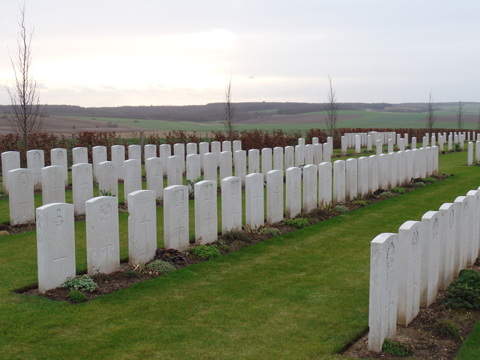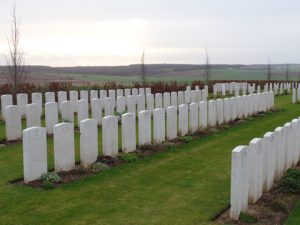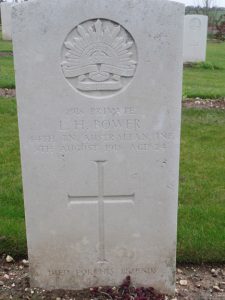HISTORICAL JOURNEYS: In the Fields of the Somme

In January 2015, Riley Kane took part in a Miami Winter Term Workshop on “The Great War at 100.” In this essay, republished for this issue and timed to coincide with the 100th anniversary of the Battle of the Somme, he reflects on one grave in the Somme region and its larger meanings.

Graves of Australian soldiers at the Australian National Memorial Cemetery.
By Riley Kane
At the Australian National Memorial in Albert I was moved to shed a few tears at a tombstone inscribed with the Bible verse “Greater love hath no man than he giveth his life for a friend.” I was further moved by the thought that a quotation on a tombstone for an Australian soldier with which I have no familial or national connection. Before that moment I was more concerned about how the war happened and how the Second World War resulted from it. I took it for granted that the war happened and never looked for meaning in it, I saw it as another episode in history with various causes and effects. But standing there in that cemetery, so moved, I thought this man and all those who perished in the war could not have died for nothing. He did not die just to prepare the world for World War Two, there had to be something the Great War alone achieved. There are those today who try to forget the war or remember it as a pointless blood-letting, the pinnacle of militaristic folly and I had let them creep into my thinking about the war. They are wrong, the Great War achieved something, it taught society a lesson: that war is horrible and men should not be sent to die lightly.
The poet laureate Rudyard Kipling serves as perhaps the greatest embodiment of this lesson. Before the First World War he romanticized warfare, in his poem If and The White Man’s Burden, but also in other works, he perpetuated the romantic vision of war during the nineteenth century. In the when the Great War broke out he pressured his son to fight, which resulted in his son’s was death in 1915. Kipling makes a great transformation after this. His poems completely change form, once long, optimistic, and confident they became short, pessimistic, and defeated. One should note that If contains 288 words, The White Man’s Burden 165. I quote the entirety of The Common Form to show Kipling’s change of spirit, “If any question why we died / Tell them, because our fathers lied.” Kipling and others lied to their children when they extolled the virtue of war, he realized with many others during the war that battles are not beautiful, they are horrible. You can feel the pain with which Kipling wrote those lines. It took a horrible loss to show Kipling the error of his ways, and a similar lesson would be repeated all across Europe and the world.
To see the Western Front today and then consider how all of it would have been destroyed over the course of the war is shocking, almost impossible. One can only try to imagine how horrible it must have felt for people to see their homeland ruined before their eyes. No war before or since has wreaked such horrific physical destruction on the landscape. It is challenging knowing what I know to envision the towns we traveled through reduced to craters and mud, or to conceive of being able to sit on a horse and look through all Ypres. Huge numbers of people participated in the war and thus saw its horrors. It is likely that in numerous nations every person was affected by the death of a loved one and therefore suffered from serious grief. (Audoin-Rouzeau and Becker 214-215) People watched their nations go to war excitedly or at least with a blithe ignorance, and saw their homes destroyed and their loved ones slaughtered.
Such serious physical and mental damage would leave a lasting impact, the First World War caused a distinct rupture with the past and made the world see warfare overall as a tragedy, something to be avoided and entered not for glory, rather for necessity. Being at the western front and visiting the staggering number of tombs and monuments made me see that the war truly was a massive tragedy. An off-hand quote by Dr. Norris during the trip captured the sentiment quite well, while in France he said: “Now you see why the French surrendered so quickly in World War Two.” The French would do anything to avoid the destruction of the First World War. It makes Chamberlain’s appeasement of Hitler now seems less cowardly and more reasonable, given the feelings of his constituents. After the war there was a broad desire for peace in the world, this inspired the League of Nations, which would lead to the UN and made it so that poets would no longer speak of war in romantic, glorious terms.
The men who gave their lives did not die for nothing. Through their sacrifice the world abandoned the romantic notions that prevailed throughout all previous history and began to abhor war. Versailles would not be enough, the second act of the Great War, World War Two, would need to end for projects of peace and unity to begin in earnest, but while it was after the Second World War that these things happened they were inspired by a peace movement that was born of the First World War. We have achieved a more peaceful world today than any before. Much work still remains, but without the tragic sacrifices of the Great War there would be no United Nations, no European Union, possibly still colonies and empires. The Great War precipitated a massive shift in the way that people saw the world. For the Great War to have caused this change it does not really matter why the war started, or what people fought for, because the collective tragedy of WWI in the long term changed how people thought about militaries and international political systems and made them yearn for peace, because they finally understood how horrible war could be.

Bibliography
Audoin-Rouzeau, Stéphane and Annette Becker. 14-18 Understanding the Great War. New York: Hill and Wang, 2002.
Riley Kane is a senior history major and president of the Miami University History Association.